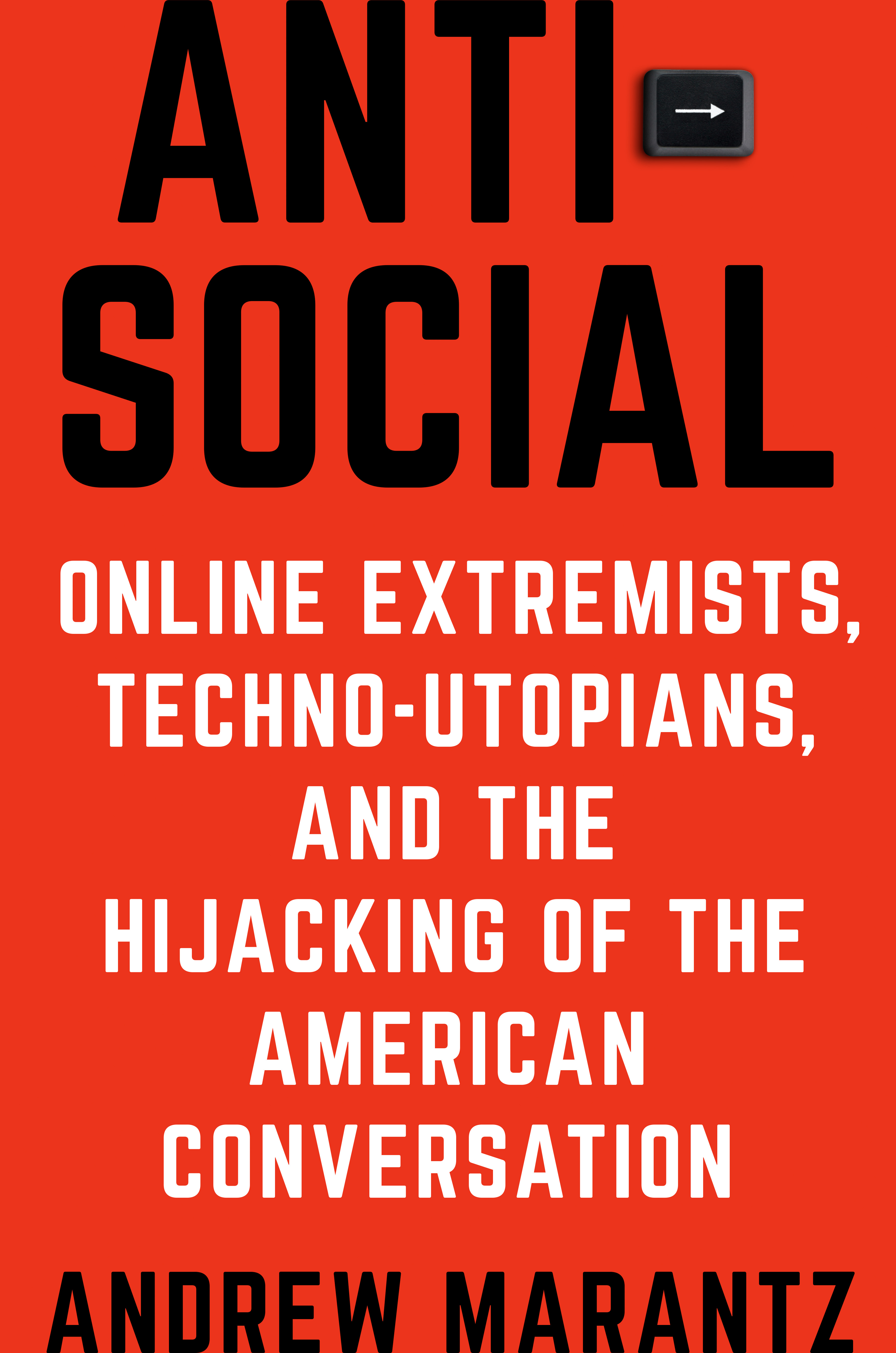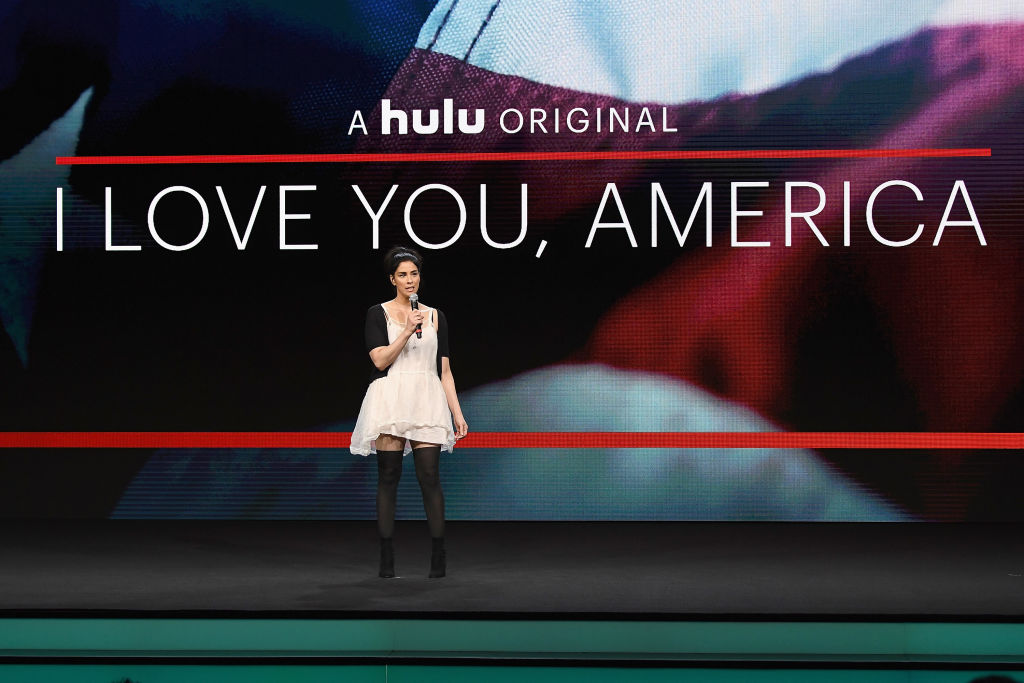“If Silicon Valley is going to keep telling itself the story that the only uses of their technology will be the most optimistic, the most hopeful, the most salubrious, the most prosocial,” New Yorker staff writer Andrew Marantz told me in Part 1 of this recent conversation for Extra Crunch, “you can try to rebut that logically, or you can just disprove it by showing a very glaring counterexample. If somebody is going around and saying, ‘all swans are white,’ you can argue against that logically, or you can just show them a black swan.”

Marantz, a brilliant and eclectic writer, has in recent years trained his attention on the tech world and its contribution to social unrest in the United States and beyond. He has just published a new book, “Antisocial: Online Extremists, Techno-Utopians, and the Hijacking of the American Conversation“, which, along with recent New Yorker essays expanding on the book’s themes, is sure to provoke debate.
How ‘the Internet broke America’ with The New Yorker’s Andrew Marantz
In part 2 of our conversation below, we discuss the Alt-Right and White Nationalists in tech and politics; Silicon Valley spirituality today; competing philosophies of tech ethics; and more.
Greg Epstein: If you look at the alt-right later that year and in 2017, I myself spent a lot of time poring over these figures like Richard Spencer and Gavin McInnes, and their videos, and their writings, and whatever thinking, ‘These guys are really taking over our society right now.
They’re rising to extraordinary influence.’ Even those of us who consider ourselves to be radically against them found ourselves obsessing over them and how to defeat them.
Then there’s now another phase that we’ve been through where finally companies have started banning them from things, and their influence seems to have waned. What should we be worried about or thinking about now when we think about the alt-right and those around them?
Andrew Marantz: I think they have had a trajectory. They have in some sense had a rise and fall narrative, which was selfishly convenient for me because it gave me a narrative arc to the book, and also part of that comes from the companies starting to piece together some form of an initial response to this. On the other hand, I do think it’s a little early to declare that we’re safe and don’t have to worry about this stuff anymore.
Basically, the way I end up coming to a conclusion about it in the book is to say, ‘Their goal was to reshape the Overton window.’ They both succeeded and failed, in the sense that they failed to reshape the Overton window in a way that allowed themselves to pass through it.
They succeeded, though, in reshaping the Overton window in all kinds of other ways. It’s not like Mike Cernovich and Richard Spencer were able to reshape an Overton window in which Mike Cernovich and Richard Spencer were anchors on CNN or something.
They were able to reshape it such that we have a very white nationalist friendly president. There’s a lot of white nationalist friendly rhetoric that does get uttered on primetime cable news shows. There are members of Congress who are saying things to New York Times reporters like, ‘What’s so bad about being a white supremacist or a white nationalist?’
The individual characters might fade from popularity as they get banned from this or that platform, or as they get humiliated publicly in this or that way, but their larger goal hasn’t necessarily been a failure.
Epstein: That’s right, and I would add that the alt-right leaders we’re talking about — Mike Cernovich, Gavin McInnes, Richard Spencer, among others you cover — I’m not sure how much TechCrunch readers will know about them, but they’re somewhat cartoonish in public personas. They’re also intelligent enough to have actual ideas about things, as scary as that is, because I couldn’t disagree with their ideas more.
Marantz: Absolutely.
Epstein: Where I see the Overton window having been moved is, people in positions of great power, with billions of dollars, running companies, making investments, influencing politics, et cetera, whose ideas ultimately aren’t that different from the ideas of the more cartoonish characters in the alt-right and alt-lights movements.
Marantz: Yeah. I don’t really see how anyone could gloat about the fact that Gavin McInnes got kicked off Twitter and Richard Spencer got punched in the face without also being chastened by the fact that Steven Miller is in the White House. I think if you’re going to gloat about one, you have to reckon with the other.
Epstein: Absolutely.
I studied at Harvard a little bit with Samuel Huntington — his most influential book was [1996’s] ‘The Clash of Civilizations’, but his 2004 book ‘Who are We?’, was incredibly influential on Richard Spencer, and I suspect on Steven Miller, as well. The argument is basically that America used to be built on pillars like whiteness, Protestantism, the Protestant work ethic, and the American creed of democracy and freedom, et cetera, and that we’ve really lost all of those pillars except for the freedom pillar, and that that’s not enough to sustain a nation.
As Fareed Zakaria, who also studied under Huntington, has pointed out: when Spencer talks about identity, as he does in your book, that’s what he’s talking about.
Marantz: Absolutely. Yeah, these guys love Huntington, they love Robert Putnam for similar reasons. They also love Charles Murray for similar reasons. They’ll use anything that allows them to give white nationalism the sheen of intellectual credibility. They really like Eric Kaufman’s new book [‘Whiteshift’] for that reason. Ultimately we’re going to have to come to a point where we just agree we’re not going to be a country based on white identity anymore.
Obviously we thought that was settled when it very much wasn’t. We had this really superficial fake moment of, ‘Oh, Obama’s president. I guess we’ve settled all these questions, and I guess we’re post-racial now.’
That was never true, but I think we’re really starting to see just how dangerous that false belief was. This is why I talk about vocabularies and Overton windows and the hijacking of the American conversation. It’s not just an intellectual exercise.
If we think we’ve agreed we’re going to be a true multi-ethnic democracy, but we haven’t really settled that question, and we just act as if we have, we’re in deep trouble.

Epstein: Indeed. Let’s turn to your two recent New Yorker essays on Silicon Valley leaders: August’s ‘Silicon Valley’s Crisis of Conscience,’ and in September, ‘The Dark Side of Techno-Utopianism.’ I’m wondering if they are going to lead to a sequel to Antisocial.
Marantz: If they’ll still talk to me.
Epstein: In the first piece, you open with the Esalen Institute: that there are two kinds of people, those who know nothing about Esalen and those who purport to know everything about it. I can’t figure out which of those kinds of people I am. Maybe I’m both.
But then you get into Tristan Harris and the Time Well Spent movement; and you end up at a retreat at a place called The Tao House, with a former Harvard divinity student, who is a bit like me. Not exactly, but I am also a Harvard Divinity School person who has spent the last 15 years working on issues of religion and secularism, and now all of a sudden I’m immersing myself in the tech world, so I found that frighteningly relatable. There are a lot of us at HDS who are talking about tech all of a sudden.
Marantz: Yeah. I should say I’m really admiring and sometimes grateful to people who are engaging with this stuff seriously. I really didn’t want to go down the path of unnecessary snark, to the point where I’m just dismissive of anyone who’s trying to address these issues.
These are obviously crucial issues to be addressed, and they can be addressed economically, through regulation. They can be addressed spirituality or socially. I’m open to all those approaches. I just think that there’s still reason to be critical, but I don’t want to be entirely dismissive.
Epstein: No, I thought some snark was perfectly justified. Necessary, even: just because we sit around talking about ethics in technology, and boy has that phrase become popular all of a sudden, doesn’t mean we’re actually making a positive impact on anything. It doesn’t mean we’re actually self-aware enough to help anybody else become aware of their own bullshit.
Silicon Valley has been clearly demonstrated to be far from its own purported ideals; somebody’s got to talk about that, to critique the tech world’s moral and political failures. But we could end up getting in even more trouble if the critique itself is problematic in a lot of the ways you demonstrate that it could be.
There’s this idea of ethics washing where if you just talk about something you call ethics, then everything is going to be great, or at least you can give the impression that everything is great, and you can keep doing what you’re doing, pilfering even more money.
Where do you see things headed? What have you learned from your own reporting that you would advise people who actually care about ethics in the technology sphere to think about?
Marantz: I really agree with the way you framed that question. It’s an appropriately complex framing. I think just to start off with, I’ve thought a lot about whether the world is better off with people like Tristan Harris doing what they’re doing, and I think the answer is pretty clearly yes.
I draw the analogy in the piece between people like Tristan Harris and people like Al Gore. I think it’s accurate. I think the world is obviously better off with people like Al Gore drawing attention to the problem of climate change.
Similarly, I think people like Tristan are right to draw attention to the information crisis we’re suffering through because of technology. That doesn’t mean that I agree with everything Al Gore says, and that doesn’t mean that I think that because he encouraged some Fortune 500 company to set up some kind of LEED-certified office or reduce their emission by 2% that that in itself is saving the world.
I do worry about climate washing in the same way that I worry about ethics washing… A band-aid is better than nothing, but if a band-aid is going to stop you from doing surgery, it could be worse than nothing.
On the whole, it’s really important to have people out in public drawing attention to these issues, because ignorance and apathy are still much bigger problems than more specific nuanced critiques of how we’re getting the questions wrong. I think the first step is just to get everybody on board with the fact that this is a huge crisis.
Then at some point, you do have to wrestle with, ‘Okay, how are we actually going to move forward with this crisis? In what ways are these companies going to fundamentally change, or in what ways are they going to appropriate and absorb the critique, and then move on and keep doing what they want to do?’ Which is something capitalism is extremely good at.

Epstein: I think some band-aids chief purpose, or at least their chief effect, ends up being to prevent necessary surgery. Maybe the same way that maybe you found yourself obsessing about whether you’re giving people a platform [as discussed in Part 1 of this conversation] that shouldn’t have a platform, as I get into this sphere, I find myself thinking all the time, ‘whatever you do, don’t be ethics washing.’
One thought that comes to mind to me about tech ethics, not that it disqualifies Tristan Harris or hopefully me, either, but most of the best people in the field are women or people of color or both. People like him, or me, I think part of our responsibility is to tell our story, and have our voice, and do our work, but not take too much of the spotlight.
Marantz: Totally. In the same way that if anyone were to read my book and think that I was the first or best critic of white supremacy or neo-authoritarianism in this country, they would be sorely mistaken. I think similarly, there are a lot of women and people of color who have been making those critiques for a long time without getting the appropriate credit. That’s I think a huge problem in both arenas. I think the question ultimately is, can people use their access and their privilege to useful ends?
I think the argument Tristan would make is that he can use his access to people in power at Google and Facebook and these other places to move the needle in ways that people who are more outside of that sphere couldn’t, and that we need both acting in tandem. I think in theory, that’s true.
The question [is], how it works in practice. The case I would make for myself being a white guy writing about this, although the alt-right doesn’t consider me white, is that I can enter their spaces, and blend in, and feel physically safe enough to do that reporting in ways maybe other people couldn’t.
I’m trying to use that in a way that’s socially advantageous, but by no means would I want that to be the only perspective out there, or for people to think that I’m pioneering that argument in some way.
Epstein: When you say the alt-right doesn’t consider you white, you’re referring obviously to being Jewish.
Marantz: Right.
Epstein: You have public conversations coming up with a couple of prominent and very different Jewish writers or activists: Bari Weiss, a writer at the New York Times known for being part of the ‘intellectual dark web,’ and Sarah Silverman, a genius comedienne. Can one have a constructive conversation with one, and then also with the other?
Marantz: I didn’t expect this book to be about Jewishness or antisemitism at all when I started writing it. I thought it was going to be about the alt-right’s misogyny, homophobia, transphobia, and Islamophobia. All that stuff was definitely there, but I was shocked at the degree to which antisemitism was a huge part of it, too. At least on the alt-right side, not on the alt-light side, or not as overtly on the alt-light side. I followed the story where it led me, and I ended up writing about antisemitism in a way that I never would have anticipated.
There’s a lot that I disagree with Bari Weiss about. I feel fine having a conversation with her around the topic of antisemitism, and I can disagree with her about how to frame and define antisemitism. I can disagree with her about whether antisemitism on the left is at all equivalent to antisemitism on the alt-right, which I don’t think it is, and which I think she sometimes comes close to claiming that it is.
With Sarah Silverman, I am interested to see whether there is a comedic take on it. Comedians have this axiomatic belief that there is no subject matter that can’t be joked about, so we’ll see. Maybe she can do it.
Epstein: I think she’s one of the smartest, best public voices out there. Her show ‘I Love You, America‘, gave me real hope, to watch how she would bring people together from opposite ends of our political spectrum, and really inspire compassion for both or all sides.
Marantz: It was a great show. She does have a lot to say on this stuff, generally in a pretty nuanced way. Sometimes in a less nuanced way, and she ends up having to walk it back. We’ll see. I think in both cases, there are obviously things to be critical of, and I’m sure people have things that they would critique me for.
In some sense that’s the purpose of a public conversation. Obviously I don’t think that anyone should be given any platform at any time, but I do think we can talk to people we disagree with.

Epstein: Is there anything else you want to share with a tech audience, a Silicon Valley audience?
Marantz: One misconception I often hear from tech-focused audiences, and this hasn’t been the case in this conversation, [is that] you often hear this implicit false dichotomy: are you for innovation or against it? Are you a techno-optimist, or are you a Luddite?
As I bang on about in the book, I don’t think it’s useful to be an across the board optimist or an across the board pessimist, both one as applies to the tech world, and when it applies to the future of American democracy more generally. I think the more useful concept is what Richard Rorty calls contingency.
Epstein: One of the messages of your book ultimately is read your Richard Rorty, along with James Baldwin.
Marantz: Absolutely.
Epstein: As a humanist who works in religious spaces, and has a lot of admiration for certain aspects of religious community-building, especially social justice work, you do something in your book that I actually end up feeling the need to do a lot, which is reminding people of this idea that Martin Luther King had of the arc of justice in the universe, and then saying, ‘I don’t believe that there was or is an arc that has conscious intention to bend.’ We’ve got to bend it.
Marantz: That’s a huge point. Again, it’s not original to me, but I do think this is why it’s helpful to think things through patiently and clearly, because if you ask someone, especially a secular humanist or a democrat with a small D, or really anyone who is not a member of the clergy, ‘who is bending the arc?’
If you really ask them to think about it, they would say ‘no one,’ or they would say, ‘we are,’ but we don’t actually think about it. We just rest in our tacit faith and our tacit assumptions, and wait for it to happen. I think as we now know, that’s hugely dangerous.
Epstein: Well said. Of course, I am a member of the clergy in addition to being a very public atheist, but that’s obviously not the norm (yet)!
Last question — as I conclude all of my TechCrunch interviews. How optimistic are you about our shared human future?
Marantz: I don’t think optimism is a useful concept. Contingency is more useful. I don’t mean to refuse the question, but I really am not an optimist or a pessimist. I’m just a Rortian.
Epstein: Very nice. Thank you so much for taking the time.
Marantz: Thanks for thinking about it so carefully. I really appreciate the questions.































Comment